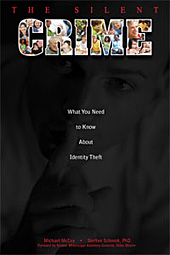AMES, Iowa -- When people think about identity theft, they usually conjure up images of computer hackers stealing their personal information online. But Steffen Schmidt, a University Professor of political science at Iowa State University, warns that there are easier ways to get that information -- like stealing your Social Security card from your wallet in an unlocked gym locker, or leaving your laptop unattended at the airport.
Schmidt and Michael McCoy -- both researchers in ISU's Center for Information Protection -- try to count the ways identity theft may be perpetrated, and also provide protection tips in a new book, "The Silent Crime: What You Need to Know About Identity Theft" (Twin Lakes Press, 2008).
"One of the misconceptions I often talk about in lectures is that when people think about identity theft, they think it's big security breaches in corporations. And they also think it's financial, which is only 27 percent of all identity thefts," said McCoy, the book's lead author, who is an ISU graduate student.
"Whether it's criminal, medical, or credit card identity theft, people want your information and there are a lot of ways they can get it," he said. "And you wouldn't believe the things people are being arrested for because their personal information was stolen and their name was traced back to the crime. It's pretty easy to clear it up once it happens, but there's time and expense to all that."
On the ID theft lecture circuit
That's why McCoy spoke before 15,000 sales associates this year at the national convention for Pre-Paid Legal Service Inc., an industry leader in identity theft protection products. But that's nothing new. He averages three lectures a week on identity theft throughout the country. Within the state, he's spoken to the State of Iowa Auditors Association and the State of Iowa Veterinarians' Convention, in addition to a number of banks and chambers of commerce.
"There is a lack of education in the marketplace on identity theft prevention," McCoy said. "There's so much ignorance out there on the subject of identity theft that it's become my passion to travel and give people that little bit of knowledge to hopefully save them time and money in the future. The industry's growing so fast -- both on the criminal side and the protection product side -- so we provide a lot of information about some common misperceptions through this book and the lecture series."
The book, which is their follow-up to "Who Is You: The Coming Epidemic of Identity Theft," features some no-nonsense tips for consumers. One key preventive measure is a reputable identity theft protection insurance policy, Schmidt says.
"If you get a really good, basic identity theft surveillance policy, it is peace of mind because you know if something all of sudden goes funny with your credit rating, you're going to find out about it very quickly -- perhaps quicker than the credit card company," said Schmidt, who is also a faculty member in the information assurance graduate program at ISU.
"In the book, we compare taking this step to having a smoke detector in your home," Schmidt explained. "You have a nose and you don't really need a smoke detector because your nose picks up smoke, but most people want to have one so they can get out of the house in time. That's the idea with identity theft insurance, and it's not very expensive, either."
Foreword by Mike Moore from "The Insider"
The new book includes a foreword by Mississippi Attorney General Mike Moore, who gained national fame by filing the first state Medicaid lawsuit against the tobacco industry -- eventually producing a $246 billion settlement to all states. Moore played himself in the film "The Insider," which portrays some of the events leading to that settlement and stars Al Pacino and Russell Crowe.
In addition to the book, McCoy and Schmidt are researchers for CIP's Identity Theft and Prevention and Protection Education Project at Iowa State, which has been funded, in part, by National Science Foundation grants. Now in its second year, the project is extracting insights from behavioral and policy research to create a more efficient employee identity theft training program for the insurance industry and law enforcement.
McCoy and Schmidt, who are both regular contributors to the popular Identity Theft Prevention Institute blog, are planning a third identity theft book which will be directed at business owners and information technology security professionals.
The new book is available in the Iowa State University Book Store (www.isubookstore.com/home.aspx, 1-800-478-0048, (515) 294-0244, or cpeitzma@iastate.edu).
